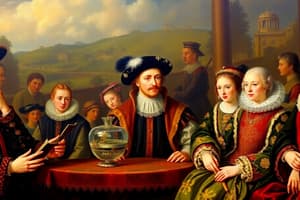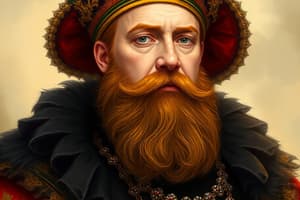Podcast
Questions and Answers
What prompted Henry VIII to initiate the English Reformation?
What prompted Henry VIII to initiate the English Reformation?
- Need for a legitimate son (correct)
- Desire for religious reforms
- Feuds with clergy members
- Support from the Pope
What was the purpose of the Act of Supremacy passed in 1534?
What was the purpose of the Act of Supremacy passed in 1534?
- To define the Church of England's doctrines
- To make the King the supreme head of the Church of England (correct)
- To enhance the Pope's authority in England
- To establish the English Church's independence from Catholic doctrine
Who was responsible for legitimizing Henry VIII's marriage to Anne Boleyn?
Who was responsible for legitimizing Henry VIII's marriage to Anne Boleyn?
- Thomas Cranmer (correct)
- The Pope
- Thomas More
- Thomas Wolsey
What did Henry VIII do to Thomas More after taking power as Chancellor?
What did Henry VIII do to Thomas More after taking power as Chancellor?
What was a significant belief stated in the Ten Articles of 1536?
What was a significant belief stated in the Ten Articles of 1536?
What action did Henry VIII take against the Roman Catholic Church's authority?
What action did Henry VIII take against the Roman Catholic Church's authority?
Why did Henry VIII face challenges in securing an annulment from the Pope?
Why did Henry VIII face challenges in securing an annulment from the Pope?
Which of the following was NOT a requirement under the Act of Supremacy?
Which of the following was NOT a requirement under the Act of Supremacy?
Flashcards
What was the English Reformation?
What was the English Reformation?
The English Reformation was a period of major religious and political change in England, beginning in the 16th century. It was characterized by a break with the Roman Catholic Church and the establishment of the Church of England.
Who was Henry VIII and what role did he play?
Who was Henry VIII and what role did he play?
Henry VIII, the King of England, was a key figure in the English Reformation. He sought an annulment from his marriage to Catherine of Aragon, but the Pope refused. This led to a break with the Roman Catholic Church and the establishment of the Church of England.
What was the Act of Supremacy?
What was the Act of Supremacy?
The Act of Supremacy, passed in 1534, declared the King as the Supreme Head of the Church of England. This act marked a significant break with the authority of the Pope and established the English monarch as the ultimate authority in religious matters.
What happened to the Church of England after the break with Rome?
What happened to the Church of England after the break with Rome?
Signup and view all the flashcards
Why did Henry VIII want an annulment?
Why did Henry VIII want an annulment?
Signup and view all the flashcards
What were the Ten Articles of 1536?
What were the Ten Articles of 1536?
Signup and view all the flashcards
Who was Thomas Cranmer and what was his role?
Who was Thomas Cranmer and what was his role?
Signup and view all the flashcards
What aspects of the Catholic Church did the Church of England retain?
What aspects of the Catholic Church did the Church of England retain?
Signup and view all the flashcards
Study Notes
English Reformation
- Began as a struggle between the king and the church
- Lollards persisted in France
- Lower clergy resented wealth and authority of high clergy
- William Tyndale published English New Testament
- 1521: Henry VIII was a religious conservative
- Published book in defense of the RCC view of sacraments
- Pope granted Henry VIII the title "Defender of the Faith"
- Henry VIII sought annulment from Catherine of Aragon
- Pope refused annulment because Charles V was Catherine's nephew.
- Henry VIII blamed Thomas Wolsey, removed his power, and charged him with treason.
- 1530: Wolsey died on the way to trial
- 1529: Henry VIII named Thomas More the new chancellor
- Henry VIII declared himself the head of the English church
- All of England had to swear allegiance to the king
- 1534: Thomas More refused, was executed
- 1533: Henry VIII secretly married Anne Boleyn
- 1534: Act of Succession passed
- Henry was now the head of the Church of England, not the Pope
- Henry VIII married Jane Seymour; she gave birth to a son
- 1540: Henry VIII married Anne of Cleves
- 1540: Henry VIII married Catherine Howard
- 1543: Henry VIII married Catherine Parr
- Act of Supremacy proclaimed the king supreme head of the Church of England
- Parliament limited fees clergy could charge
- Bishops were required to live in their sees
- Clergy ruled under civil law
- Church of England under Henry VIII was similar to the RCC in doctrine
Break with Rome
- After the Break with Rome, the English church was similar to the RCC, but with the king as head.
- 1536: Ten Articles detailed salvation by faith alone, sacraments, and rejected purgatory but kept transubstantiation and clerical celibacy.
- 1542: Henry VIII executed Catherine Howard
- 1547: Henry VIII died
- The Catholic Reformation responded to Protestant success.
- Pope reasserted papal authority and strengthened RCC organization.
- Retreat to dogmatism and strengthening of the papacy.
- Commission under Pope Paul III investigated Catholic reforms
- 1536: Pope Paul III established the Inquisition in Rome.
- 1559:Pope Paul IV created the Index of Banned Books, resulting in papal censorship
- Henry VIII disbanded monasteries
- Thomas Cromwell oversaw disbandment
- Abbeys and monasteries were sold (mostly to nobles)
- Royal revenue doubled
The Counter-Reformation
- Response to Protestants' success
- Pope reasserted papal authority
- Strengthened RCC organization
- Retreat to dogmatism
Studying That Suits You
Use AI to generate personalized quizzes and flashcards to suit your learning preferences.




